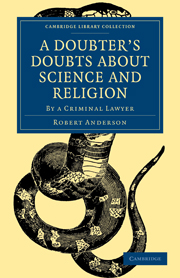Summary
“We are without any rational ground for believing in science;” “We are without any rational ground for determining the logical relation which ought to subsist between science and religion.” Such are among the startling theses maintained by the author of A Defence of Philosophic Doubt. And one of the main results of his argument is stated thus: “In the absence, then, of reason to the contrary, I am content,” he says, “to regard the two great creeds by which we attempt to regulate our lives as resting in the main upon separate bases.” A protest this against “the existence of a whole class of ‘apologists’ the end of whose labours appears to be to explain, or to explain away, every appearance of contradiction between the two.”
But here Mr. Balfour fails of his usual precision. A definition of religion is wanting. He seems sometimes to use the word in its first and widest sense, and at other times as equivalent to a particular system of belief, and, by implication, to Christianity. A consciousness of our own existence is the foundation of all knowledge. And that elementary fact is the first stepping-stone by the aid of which we apprehend the existence of God. It might be fairly argued that our knowledge of the existence of God rests upon a surer basis than our knowledge of the external world, and therefore that religion in that sense takes precedence of science.
- Type
- Chapter
- Information
- A Doubter's Doubts about Science and ReligionBy a Criminal Lawyer, pp. 79 - 94Publisher: Cambridge University PressPrint publication year: 2009First published in: 1889

